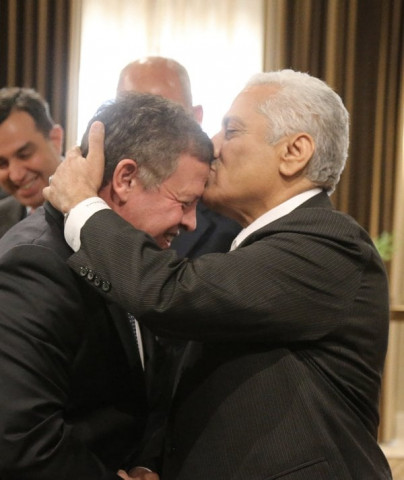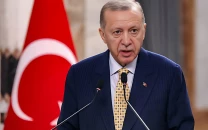Jordan's King Abdullah dissolves parliament, names caretaker PM
The king accepted the resignation of PM Abdullah Ensour before appointing Hani Mulqi by royal decree

King Abdullah accepted the resignation of PM Abdullah Ensour before appointing Hani Mulqi by royal decree. PHOTO: TWITTER/@RHCJO
The king accepted the resignation of Prime Minister Abdullah Ensour before appointing Mulqi by royal decree.
His Majesty King Abdullah II receives former Prime Minister Dr. Abdullah Ensour & members of the outgoing government pic.twitter.com/qXjHzo5dEL
— RHC (@RHCJO) May 29, 2016
Mulki has held senior government posts in successive administrations. Under the constitutional rules the election must be held within four months.
Jordan traditionally votes according to tribal and family allegiances but parliament amended the electoral laws in March in a move government sources and political analysts say will lead to more candidates from political parties vying for votes.
Jordan halts Jerusalem Al-Aqsa cameras project
Analysts say the tribal lawmakers who dominated the last parliament had tried to resist changes which might undermine their influence, under a system that still favours sparsely populated tribal areas which benefit most from state patronage.
Jordan's main political opposition comes from the Muslim Brotherhood movement but it faces increasing legal curbs on its activities, leaving mostly pro-monarchy parties and some independents and politicians to compete in these elections, the political analysts say.
The Brotherhood, wants sweeping political reforms but stops short of demanding the overthrow of the monarchy in Jordan. Its political arm in Jordan, the Islamic Action Front, represents many disenfranchised Jordanians of Palestinian origin, who are in the majority in the population of seven million and live mostly in urban areas.
COAS meets King Abdullah
Analysts say it could be difficult for the Brotherhood, which has operated legally in Jordan for decades, to participate in the election after the authorities closed many of its offices and encouraged a splinter group to legally challenge the main movement's licence to operate.
Western diplomats and independent politicians say the absence of the group, which has strong grassroots support in urban centres, could undermine the legitimacy of the election.
Western donors have pushed Jordan's authorities to widen political representation to stem radicalisation among alienated and unemployed young people in poor overcrowded areas. Hundreds of them have already joined extremists in Syria and Iraq.


1725099588-0/BeFunky-(41)1725099588-0-208x130.webp)
















COMMENTS
Comments are moderated and generally will be posted if they are on-topic and not abusive.
For more information, please see our Comments FAQ